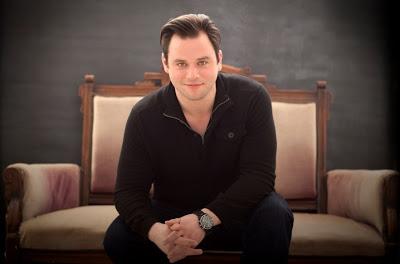by Paul J. Pelkonen

Songs from the big chair: tenor Paul Appleby gave a recital at Zankel Hall Wednesday night.
Photo by Dario Acosta © 2016 Paulapplebytenor.com
Mr. Appleby has made waves at his alma mater and the Met in recent years, with starring roles in The Bartered Bride and the Nico Muhly opera Two Boys. He also had a scene-stealing appearance as Hylas in the Met's last revival of Les Troyens. Here, he offered a program split neatly between German art song, a new work by composer Matthew Aucoin and esoteric works by Villa-Lobos and Berlioz, delivered in a genial manner that recalled the art song stars of the golden age of vinyl.
Accompanied by Metropolitan Opera in-house pianist Ken Noda, Mr. Appleby offered a platter of German art song in the first half of the program, starting with a setting of "Das Fischermädchen" by the composer Franz Lachner. This text was also set by Schubert, but the Lachner version offers a more florid reading of the story. Mr. Appleby recounted the narrator's love for a girl from a seaside community, delving into the depths of passion with the recapitulation of the opening verse.
Next up, the Liederkreis by Robert Schumann, written in 1840, the year that the composer devoted to art song. This is a cycle of broken hearts and unrequited love: poems by Heinrich Heine that chronicle the quick death of a relationship, heartbreak, grief and finally the healing process. These performances were psychologically probing, helped by a dollop of dramatic acting from the artist and the three flexible voices that he used: a sweet head tone, a deep, contemplative chest register and finally, the full force of his considerable instrument projected from the diaphragm and ringing out into the bright acoustic.
Four songs by Hugo Wolf followed. Like Schumann, Wolf went mad and died in an asylum following the effects of syphilis. But he stands on the other side of the chromatic revolution of Liszt and Wagner, and his songs are like miniature operas that draw a complex narrative picture and make great demands on the singer and accompanist. The signature Wolf sound was present in these four settings of poems by Joseph von Eichendorff, culminating in "Seemanns Abschied", a kindred spirit to the overture to Die fliegende Holländer with its fast outer verses and compelling use of nautical imagery and onomatopoeia.
The second half of the program featured a change of accompanist, with Mr Aucoin joining Mr. Appleby to play the keyboard parts in his cycle of songs based on the poetry of the late Joseph Merrill. Commissioned as part of Carnegie Hall's current celebration of its 125th anniversary, these were compelling works that constantly forced singer and audience off balance. Mr. Appleby used all of his resources, reaching for his highest notes and other times delivering the text in something close to speech. Mr. Aucoin demonstrated his piano virtuosity in his own parts, from rumblings in the bass register to right-hand minor key trills that set the teeth on edge. The songs dealt compellingly with Mr. Merrill's sexual orientation and environmental issues, with highlights including the brief but compelling "Grass" and the heart-wrenching setting of "The Changing Light at Sandover."
Mr. Appleby then brought Mr. Noda back to the stage for three songs sampled from Hector Berlioz' Les nuits d'été. Although these are orchestral works, Mr. Appleby and Mr. Noda offered a compelling argument for performing these decidedly unpianistic works with just piano and voice. They were followed by three songs by Heitor Villa-Lobos, culminating in that composer's "Samba Classico." Mr. Appleby sung the Portuguese text with raw, emotional force, accompanied by Mr. Noda's supple rhythms as he conveyed the uniquely Brazilian concept of saudade, the emotional nostalgia that beats at the heart of this music.
The tenor then obliged the crowd with an encore consisting of two two requests. The first was from his wife: Benjamin Britten's setting of "The Water is Wide", a Scottish folk song of tragedy and loss. This was followed by Mr. Noda's suggestion for an encore: the "Kuda, kuda kuda" aria sung by the doomed Lensky in Act II of Tchaikovsky's Eugene Onegin. Despite being in a recital format and accompanied by the piano, Mr. Appleby conveyed the raw emotion of the character in this performance, giving the words an authenticity and angst. As he walked off to considerable applause, one imagined that he was on his way to duel Onegin backstage.

